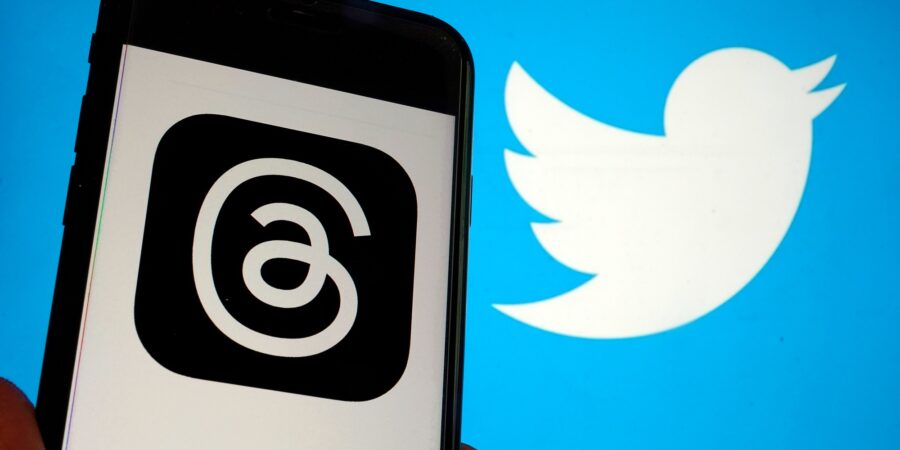Last month, two of the world’s richest and most influential men, who happen to run rival social media networks, appeared to goad each other into agreeing to a fight, setting their platforms abuzz at the notion of a “cage match” between the billionaires. It was supposed to be, in many ways, the ultimate cage fight. But it turns out that the fight won’t happen with fists but algorithms. The real battle started on Thursday when Zuckerberg launched Threads, his company’s Twitter competitor.
Threads is a Twitter clone that Meta launched as a companion to Instagram, the popular photo-sharing network it bought over a decade ago. Meta’s attack on Twitter is the most interesting fight in social media since Google+ tried to unseat Facebook. Many are referring to Threads as a “Twitter killer.”
The timing of Threads’ launch is what gives it such a threatening stance. On Saturday, thousands of Twitter users complained about getting an error message that they had “exceeded” their “rate limit.” Then Elon Musk confirmed their concerns when he said that Twitter temporarily limited the number of posts users can read daily to address concerns over data scraping. As a sole event, that might not have been enough to force users to a new platform. But since he acquired the platform, Musk has changed the experience of Twitter by tinkering with its algorithm and other features. Many of these changes have received criticism from users. So Saturday’s saga was just another piece of the domino that fell.
In a post to his Threads account on Wednesday, Zuckerberg said: “I think there should be a public conversations app with one billion+ people on it. Twitter has had the opportunity to do this but hasn’t nailed it. Hopefully, we will.”
Musk weighed in, saying he was not impressed by Threads and claimed he had cancelled his Instagram account. “It is infinitely preferable to be attacked by strangers on Twitter than indulge in the false happiness of hide-the-pain Instagram,” he wrote on Twitter.
Threads gained over 50 million users on its first day, signalling that many people are excited about its launch and are likely tired of Musk’s numerous experiments. For context, that’s almost 20 per cent of Twitter’s 259.4 million daily active users. Many tech companies have tried capitalizing on Twitter’s turmoil in recent months, including Donald Trump’s Truth Social. However, most users who try migrating end up returning. But Threads has a leg up, backed by Meta’s deep pockets and Instagram’s enormous user base of over two billion monthly active users globally. And now, the big question on everyone’s mind is whether or not Threads can become the next microblogging giant.
Threads is too big for Twitter to ignore
Twitter might have gotten by all other attempts to recreate its product by simply ignoring them. But Threads is the company’s first real threat, and even its CEO knows. Meta is counting on three things to succeed, but whether they will be enough is another conversation.
First, Threads starts out with the power of the Instagram network behind it. Users can log in with their Instagram account and bring their existing contacts with them. This is helping Threads to grow its network quickly. But it also makes it harder to leave. Users cannot delete their Threads account without deleting their Instagram account.
However, the tie to Instagram also suggests another possibility. Threads could be a place for a different kind of conversation. If Twitter is where journalists, politicians and policy wonks congregate to fight over the news of the day, maybe Instagram’s more creative style can turn Threads into what Meta calls “a positive and creative venue for your ideas”. But in the end, it is the users who decide what a network is used for, not its owner.
Secondly, Meta hopes that Threads will appeal to users who are fed up with Elon Musk’s controversial ownership of Twitter. Many users have complained that the network has become a more hostile environment since he took over. And these complaints point back to Musk’s campaign to relax restrictions on speech and his move to strip back the platform’s content moderation efforts. Also, Musk’s own often erratic antics on Twitter soured the view of many users. Now, Threads wants to be that alternative with better content controls. But Meta also has its history of content moderation failures.
The third — and most intriguing — pitch Meta has made is that Threads is interoperable. Users will eventually be able to communicate with people on other networks, reading posts or allowing their own to flow beyond Threads itself. This feature is quite the opposite of what Meta has been doing with its platforms. It normally keeps control over everything its users do, and that business model has worked so far. Advertisers are often more impressed with platforms that have enough control of their audience. But Threads is the company’s chance to experiment with this new model on an app far away from its core products.
Twitter’s biggest shortcoming in its 17-year history stems from not doing enough to adapt and evolve its service to capture a larger audience. It has been punching under its weight for so long. But now the weight class has changed, and it’s up against the biggest social network. Winning the data wars will mean Musk has to somehow beat Zuckerberg in his own territory. Will that happen? Time will tell.





